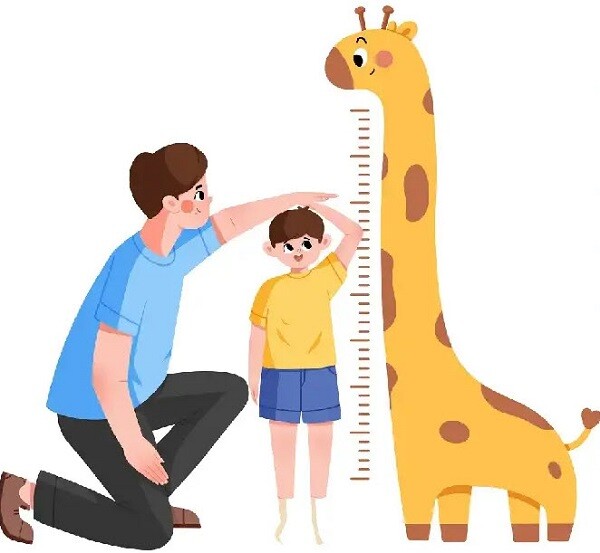All parents want their children to grow taller and keep up with their peers.

Suggested height calculation methods for children
Parents can use the following methods to calculate their child’s adult height and understand their growth pattern, alleviating unnecessary worries.
The CMH Method
– For boys: (father’s height + mother’s height + 13) / 2 ±5cm.
– For girls: (father’s height + mother’s height – 13) / 2 ±5cm.
The FPH Method
– For boys: 45.99 + 0.78 x average height of parents ±5.29.
– For girls: 37.85 + 0.75 x average height of parents ±5.29.

Parents can refer to these methods to check their child’s height growth rate.
Using growth charts, parents can determine if their child’s height is within the normal range for their age. However, for children with abnormal height growth, the margin of error may be larger.
By combining these two sets of data, parents can make a preliminary assessment of their child’s height development and timely identify any potential issues.

Six key indicators that may hinder a child’s height growth
When monitoring your child’s height, pay attention to these six signs that may indicate slower height growth and take timely action.
Look at their feet
A child’s foot size and development are important indicators of their overall growth, especially height. The feet provide the foundation for movement and reflect the maturity of their bones and joints. As children grow, their feet will change in size and shape, mirroring the development of other body parts.
If you notice that your child’s feet haven’t changed much over an extended period, or their growth lags significantly behind their peers, it could be a warning sign of restricted height development. Improper foot development is often associated with various factors, including genetics, nutrition, and physical activity levels.

Lack of change in foot size can indicate potential height development issues.
Bone age and growth hormone abnormalities
Bone age is a critical indicator for assessing the maturity of a child’s skeletal system. If their bone age is younger than their actual age, it may suggest that their bones are developing more slowly than their peers.
This condition can raise concerns about height development. When bones don’t develop properly, children may struggle to reach their full height potential during puberty.
Additionally, abnormal growth hormone secretion can significantly impact height development. Growth hormones play a crucial role in stimulating bone and other tissue growth in the body.
This condition can arise from various causes, including endocrine disorders, genetic factors, or even inadequate nutrition.
Mood swings and irritability
Changes in mood can also affect a child’s development.
Frequent crying and irritability in children can indicate endocrine disorders, which, in turn, can affect growth hormone secretion and bone development.
Lack of exercise
Inactivity can lead to underdeveloped muscles and bones, impacting height growth. Exercise stimulates bone growth, strengthens muscles, and promotes growth hormone secretion.
Picky eating and anorexia
Children who are picky eaters or anorexic tend to reject certain foods, leading to an unbalanced nutrient intake.
Picky eating and anorexia affect the absorption of essential nutrients, which, in turn, impacts their overall growth and development.

Picky eating and anorexia lead to an unbalanced nutrient intake.
Family genetic factors
If some family members are shorter, the child may inherit this trait.
While genetics play a role in determining height, it is not absolute. Even if there are shorter members in the family, a child can still grow taller by improving their habits and environment.

How can we help our children grow taller?
To promote height growth, focus on a balanced diet, regular exercise, and adequate sleep. Adjust their study and rest habits, provide proper nutrition, and ensure they get enough sleep to facilitate growth hormone secretion.
Balanced diet
Ensuring your child has a balanced diet with sufficient vitamins and trace elements is crucial for their overall development.
A proper diet not only maintains their health but also plays a vital role in height growth and muscle development. To achieve this, parents should focus on providing adequate protein, healthy fats, and calories in their daily meals.
Include protein-rich foods like meat, fish, eggs, beans, and dairy in their diet. Prioritize healthy fats like olive oil, butter, and nuts over saturated fats from processed foods.

Parental support is key to a child’s healthy development.
Adequate sleep
A child’s growth depends on growth hormones, and the secretion of these hormones is regulated by their sleep patterns. Growth hormones are produced in smaller amounts during the day and primarily at night. Deeper sleep results in higher hormone secretion.
The peak period for growth hormone secretion is 1-2 hours after falling asleep, with levels up to three times higher than during the day.
Proper exercise
Exercise effectively stimulates bone growth and promotes the development of bone tissue. It can also accelerate the body’s metabolism and regulate hormone secretion to a certain extent.
Sports like basketball, volleyball, and skipping rope can promote height growth.
“The 3-Pronged Approach to Parenting: Nurturing Well-Rounded and Successful Children”
As parents, we all aspire to raise our children to be successful and well-rounded individuals. However, it is important to recognize that traditional textbook education may not always be the best approach for our little ones. It is crucial to explore alternative methods and tailor our teaching strategies to suit their unique needs and learning styles. By embracing a diverse range of educational tools and embracing each child’s individuality, we can empower them to reach their full potential and thrive in their own unique way.






































